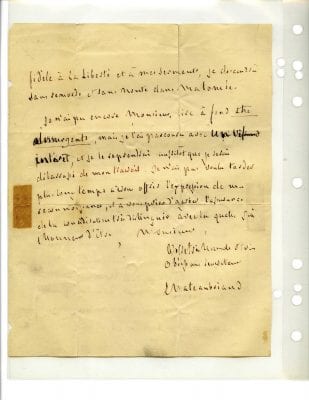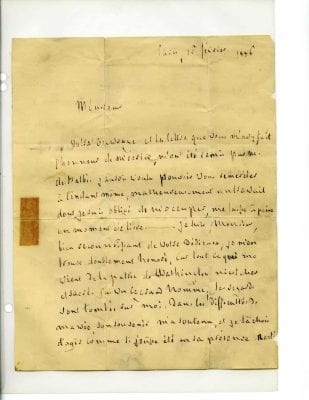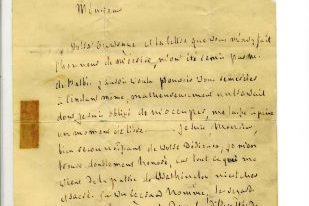When François-René, vicomte de Chateaubriand, pioneer of the Romantic literary movement, future member of the Académie française, and steadfast defender of the Catholic Church, visited America in 1792, he wrote of the stunning beauty of the Hudson Valley, the tribal customs of the Native Americans, and an inspirational, heartfelt meeting with George Washington outside Philadelphia.
There was only one problem: He made it up.
Well, much of it. Since 1903, scholars have been in virtual agreement that the poet, thinker, and defiant royalist embellished much of his experiences in America—which, despite doubts about their veracity, informed much of the early 19th-century European imagination about America.
Whatever doubt there is today about his historical methods, there’s no denying Chateaubriand was a brilliant writer, especially of fiction and what we’d today call the travelogue. He not only influenced Romantics such
as Victor Hugo (who once wrote, “To be Chateaubriand or nothing”) but had a profound influence on Alexis de Tocqueville, whose voluminous Democracy in America (1835; 1840) continues to inspire contemporary intellectuals examining the question of American exceptionalism.
And, it seems, Chateaubriand influenced a certain Ralph Ingersoll Lockwood, who dedicated his 1835 novel The Insurgents to the vicomte.
This is where it gets interesting, and where a chance encounter with an old book in a dusty attic by a College of Steubenville student in 1964 reveals something of how America has long captured the imagination of writers.
Above: Scans of Chateaubriand’s original letter to American author Ralph Ingersoll Lockwood, who dedicated his 1835 novel The Insurgents to the vicomte.
While we don’t know the student’s name, we do know that Father Gilbert Barth, TOR, who taught foreign languages at the College of Steubenville during the 1960s, published a December 1964 column in Modern Language Notes detailing how one of his students discovered a copy of The Insurgent containing a letter from Chateaubriand himself. In the letter, which is dated February 15, 1836, the French writer expresses his gratitude for Lockwood’s dedication and a copy of the novel, which he admits he only skimmed.
But what’s truly fascinating is the vicomte’s reference to Washington. “His eyes fell on me: In the difficulties
of my life, the memory of him sustained me,” Chateaubriand writes, noting how honored he was to receive such a dedication because “everything that comes to me from Washington’s homeland is dear and sacred to me.”
Does Chateaubriand’s letter revive the possibility that an audience with Washington took place? It’s unlikely given the body of evidence. More plausibly, the reference reveals the extent to which one of the founders of the Romantic literary movement internalized the virtue, kinship, and promise in America—promise he saw embodied, even if from afar, in the first president.
Special thanks to Franciscan University reference librarian Viola Chontos for her help identifying the letter, and graduate student Marek Doroshenko for his assistance translating.










